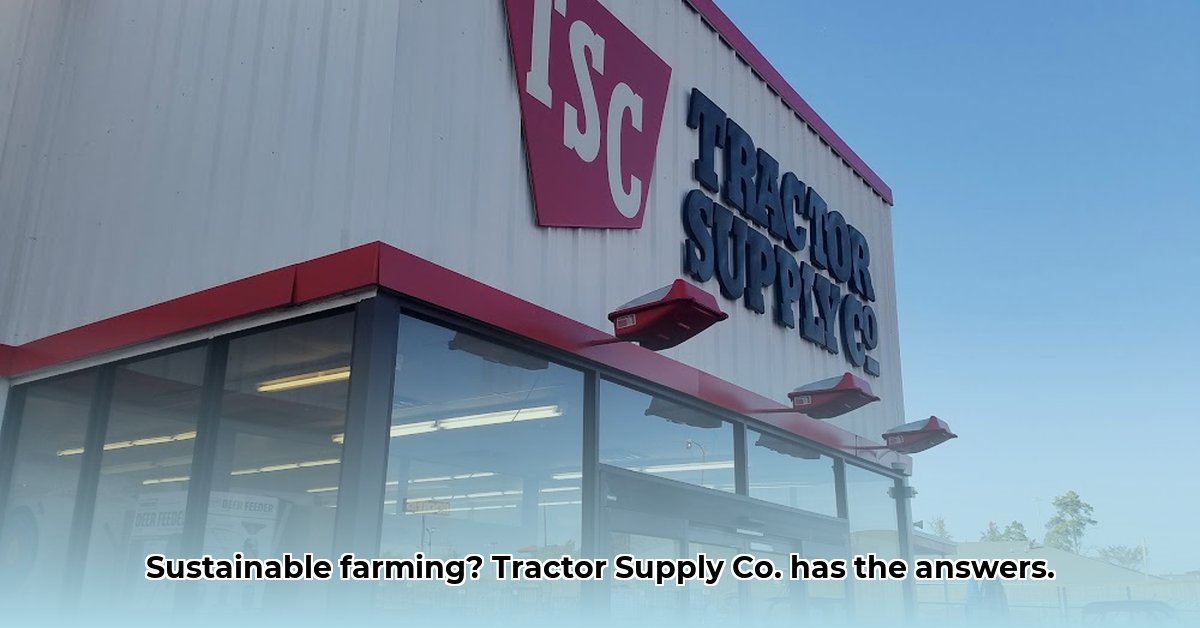
Tractor Supply Co. New Boston: Supporting Sustainable Agriculture
Tractor Supply Co. (TSC) in New Boston, Texas plays a significant role in the local agricultural community, providing essential supplies to farmers, ranchers, and home gardeners. Its diverse product offerings directly influence the sustainability of local food production methods. But how effective is TSC in supporting truly sustainable practices? This case study examines TSC's contribution, highlighting both its strengths and areas for improvement. For a detailed list of products, see the TSC New Boston product catalog.
Sustainable Solutions Available at TSC New Boston
TSC New Boston offers a wide range of products that can contribute to sustainable agriculture. These include organic fertilizers, pest control solutions (both chemical and biological), water-saving irrigation systems, and energy-efficient equipment. The availability of these products empowers farmers and gardeners to make conscious choices that minimize their environmental impact. However, the extent to which these options are prominently displayed and readily accessible requires further investigation. Does the sheer volume of conventional products overshadow the eco-friendly alternatives? This is a crucial question for future assessment.
Don't just take our word for it. “While the selection is growing, a wider variety of organic seeds and more explicitly labeled sustainable products would significantly improve their impact,” says Dr. Emily Carter, Agricultural Sustainability Expert at Texas A&M University.
Expanding Sustainable Choices: Opportunities for Growth
While TSC offers a variety of sustainable products, opportunities exist for significant expansion. A more extensive selection of organic seeds, advanced water management systems, and diverse eco-friendly pest control options would greatly benefit environmentally conscious customers. Further, strategic partnerships with local organic farmers could create mutually beneficial relationships, boosting local economies and providing TSC with a direct source of sustainably grown goods. This synergistic approach could dramatically increase the availability of sustainable products.
A crucial question arises: How can TSC better highlight its sustainable offerings? A more prominent placement of eco-friendly products, clearer labeling of sustainable certifications (e.g., USDA Organic), and targeted marketing campaigns could significantly increase consumer awareness and adoption.
Actionable Steps Towards a Greener Future
Consumers can directly influence the sustainability of their local food system through these key actions:
Engage with TSC Staff: Actively inquire about sustainable product options and share your preferences. This feedback directly influences TSC's purchasing decisions.
Support Local Producers: Whenever possible, purchase locally sourced produce and support area farmers to strengthen the local economy and promote sustainable agricultural methods. The success of local farmers directly correlates with the health of the ecosystem.
Provide Constructive Feedback: Share your suggestions for improving TSC's sustainable product offerings via surveys, online reviews, or direct communication. Your feedback can directly shape their future inventory and environmental commitments.
Building a Sustainable Community: A Collaborative Effort
The future of sustainable agriculture in New Boston hinges on collaborative efforts between TSC, local farmers, and consumers. TSC's commitment to offering sustainable products, combined with consumer demand and informed purchasing decisions, is paramount. Open communication channels and mutually beneficial partnerships are key to fostering a more ecologically responsible future. The potential for positive change is significant, demanding proactive engagement from all stakeholders. Are you ready to be a part of this positive transformation?
Pros and Cons of Using Tractor Supply for Sustainable Products:
| Pros | Cons |
|---|---|
| Wide range of essential farm supplies. | Selection of organic and sustainable products may be limited. |
| Convenient location and accessibility. | May not always carry the most cutting-edge sustainable technologies. |
| Potential for local agriculture support. | Needs more explicit focus on labeling and promoting eco-friendly offerings. |
| Opportunities for future collaboration. | Some products may have high carbon footprints due to transportation. |
Remember: building a truly sustainable agricultural system is a continuous process of improvement and adaptation. By being informed, actively engaging, and supporting local businesses committed to sustainability, we can collectively contribute to a healthier future for New Boston.